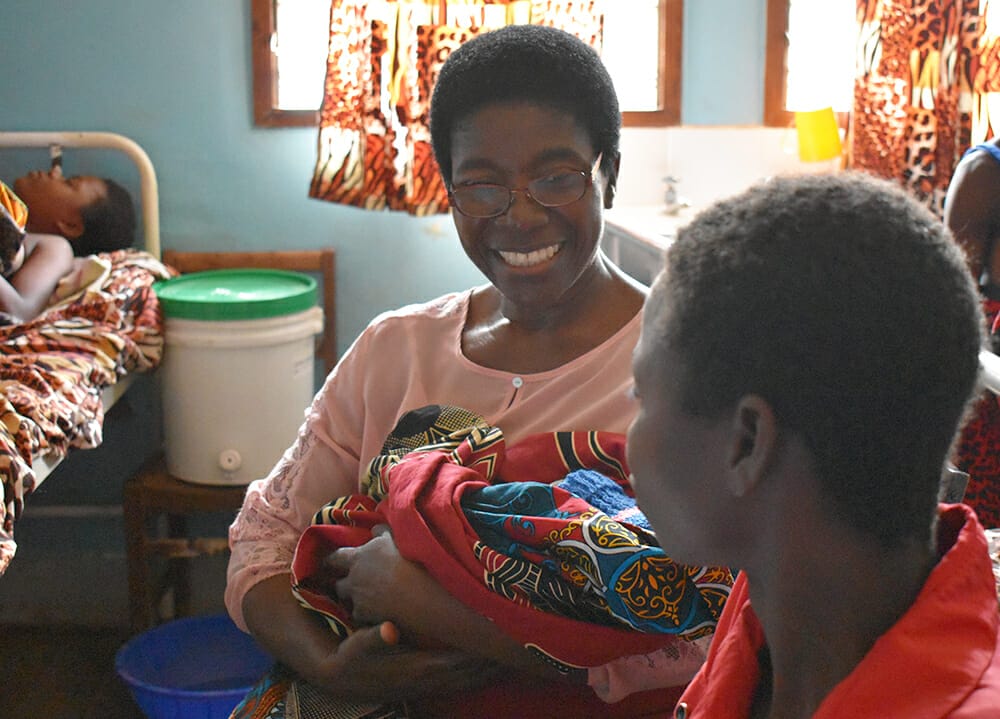News > Blog
Midwives Matter: A Lifeline for Vulnerable Mothers and Babies in Malawi
Published 05/05/2019 by Global Communities

Irene Kamanga’s career was born in a waiting room.
Growing up in a rural area of Malawi, she saw how difficult it was to access care due to the lack of nearby health facilities and inadequate staffing.
“It took long to get treatment even when you were at the health center, because there was only one nurse and one medical assistant,” Kamanga recalls. “Therefore, we would wait for treatment while the nurse midwife was attending to a woman in labor, conducting antenatal checkups.”
To help fill this gap and deliver a higher and more immediate level of care for some of the most vulnerable people in her country, Kamanga became a midwife. For nearly 30 years, she has helped women in Malawi have healthy pregnancies and safe births.
“Women were not treated well in the community. They were violated physically and emotionally and were voiceless,” Kamanga says. “They could not speak for themselves, let alone do anything without getting consent from their male relatives. I wanted to make life a little easier, especially when pregnant and sick.”
Now, as technical advisor for PCI’s U.S. Agency for International Development-funded Every Preemie—SCALE project (Every Preemie), Kamanga is doing far more than just making life easier for these women. She is helping their fragile newborns survive by teaching health providers, caregivers and other family members how to better care for small and sick babies.
“Generally, the critical problems which we have as a country are tied to reproductive, maternal, newborn and child health,” Kamanga says. “If we don’t have the mother’s health at heart and they are not taken care of, then I think the overall health outcomes for the country will be bad. And you cannot talk about a woman’s health minus her pregnancy. The mother will not be productive in any way as long as her child is sick.”
In Malawi, nearly 1 in 5 babies is born preterm and 1 in 45 newborns dies within the first four weeks of life. Lack of access to warmth, breastfeeding support and basic care for infections and breathing problems contribute to these poor outcomes.
To help turn the tide on these preventable deaths, Every Preemie designed and implemented the Family-Led Care model in partnership with the Malawi Ministry of Health. The model improves quality of care of early/small babies in health facilities and empowers families to confidently care for their babies both in the facility and after returning home.

Irene Kamanga (right), technical advisor for PCI’s Every Preemie—SCALE project, and Annie Nkosi, the Kangaroo Mother Care coordinator at Balaka District Hospital, check a new weighing scale at the Mbera Health Centre in Malawi’s Balaka district. The pair were visiting the facility as part of a monthly supervisory visit for health centers implementing the Family-Led Care model. Photo by Maureen Simpson/PCI
“A newborn cannot do anything on its own, but a newborn’s condition can change quickly when helped on time,” Kamanga says.
At the facility level, that means ensuring mothers and their preterm/low birth weight (LBW) babies receive immediate specialized care and continuous monitoring after delivery. Every Preemie and the Family-Led Care model have helped make this possible in Malawi’s Balaka district by training support staff in eight health centers and one hospital to provide care when nurses are unavailable.
“Before, their role was to keep the ward clean and other errands, but now they are doing this additional work willingly and happily. They have become advocates,” Kamanga says. “When the nurses are unable to counsel the mothers, the support staff are able to do that. When the service providers cannot teach the mothers how to put the babies on skin-to-skin, the support staff are doing that. They even know how to check the vitals.”
Another significant change that has come through the project and Kamanga’s technical support and guidance is a better documentation and referral system. Before, preterm/LBW babies were treated and discharged like any other newborn, without accounting for their unique needs. Now, they each have a file to keep track of their progress and specific health challenges. Families are encouraged to come for weekly follow-up visits until the babies reach 2,500 grams (5.5 pounds). Caregivers also learn how to recognize danger signs and seek emergency care if necessary.
“At first, we didn’t have case notes for the babies and no monitoring of their situation. Now, each and every eligible baby is admitted,” Kamanga says. “Each one of them has case notes and the babies are monitored. You can literally see that things are changing.”
Aside from improving facility- and home-based care of preterm/LBW newborns, Kamanga says the Every Preemie project and Family-Led Care model are changing how communities view and treat these vulnerable babies. In the past, many people just assumed that newborns who were born too early or too small did not have a chance to survive or were the result of promiscuous fathers, among other misconceptions.
“By including family members and community members in the model and educating them on what these babies need, we are addressing critical issues and myths,” she says. “If the community doesn’t accept the preterm baby or they don’t accept skin-to-skin contact, then that will influence the parents. But if they understand and accept [the situation], they will support the mother positively. They are part and parcel of raising children into adulthood. We all have a role to play in caring for these babies.”




